 |
 |
|
 |

|
My Scotland, My
Perthshire
Photos by Authors
|
||||
|
Like any emigrant to North America I miss my memories.
I miss the Scots' simplicity, their common sense, their frugality. They see North America as a throwaway society; if something doesn't work it gets thrown out. My favorite aunt used to ask me when I visited her, "How are the grandchildren?" I didn't have any then but she had explained all this before: the Old World (Europe) was the grandparent and the United States will all its albeit well meaning blunders was the grandchild, making all the mistakes a child could make.
In my youth, children didn't make many mistakes. Life was simple. There wasn't a great deal of "stuff" going on. Born during the Depression then raised in wartime Britain we learned to amuse ourselves with simple things. We would explore river banks, scramble over heather in gorgeous bloom, surely the original Color Purple, hike everywhere, anywhere, to find panoramic views of the countryside or ancient battlefields or ancient monuments, wandering over sprawling estates whose owners had only one demand, "Close the gates after you." I miss Scotland for its legends, its mystique, its romantic history. I miss the Scots' dry, self-mocking sense of humor. Their best stories ---whether around the fireplace or behind the bar counter in a pub---always made fun of themselves. The Scots don't take themselves too seriously. I miss that in many of my American friends and suspect others might agree humorless persons can be hard to deal with. An old Scottish doctor friend once told me one of his patients retired, got bored and took a job as the janitor in a city park. Said my friend, this patient came in one day with a minor problem. I asked how the job was going. He replied: "Oh doctor, times are so different. People come into the toilets for all sorts of terrible reasons. When someone comes in for an honest to goodness crap it's like a breath of fresh air!" Joking apart I miss Scotland's fresh air. I miss the fresh water running down from the hills hurrying in shallow streams over the river bed gravel that gives the purity, the basis of the velvet Scotch. I miss the evening light that lasts in summer almost to midnight even though it made it hard for my kids to fall asleep when they were on vacation with us. I miss the strange luminosity in the day when the sun comes out---if only for a moment---until the next burst of rain, though I curse the weather when I have to drive alternating sunglasses and windshield wipers every few minutes. Yes Scotland can be wet and cold. Visitors need to know they're not coming for the sun, although Scotland on a beautiful day in May or September can be the envy of Europe and, in the 30 or so trips I've made since 1960, I've often had great weather by avoiding Scotland's temperamental summer. One day in late April, for example, I was walking along a road enjoying the most glorious Scottish spring we'd had in many a year when I came up on an old lady. "Can you remember a spring like this?" I asked in passing. She called after me, "I cannae rrrememberrr a summerrr like this." But come not for Scotland's weather but for its scenery: Undulating green hills in the Borders area southern lowlands not unlike Vermont's; craggy granite peaks in the north like the foothills of our Rockies; sleepy fishing villages like the Maritime provinces; magnificent baronial homes like Connecticut's---you'll see how New England got its name. And come for quiet times and the simple life. Come to the county where I grew up -- Perthshire, in the very heart of Scotland. Located in the geographical center of the country the area has played an important role in this nation's long and turbulent history. Just as every place in Colonial America brags "George Washington slept here" so Perthshire can claim it has hosted Macbeth, Mary Queen of Scots, Queen Victoria and Robert Burns among many others. It has always been a very stable community. The population didn't change for 150 years: it was 126,000 in 1801 and 128,000 in 1951. Crieff, my hometown, had similar statistics. It had 6,000 of a population 200 years ago and when I was going to school it had the same number. I once heard an explanation in a pub: "In Crieff, every time a girl has a baby a boy leaves town."
The population numbers have changed now as a result of tourism. Visitors come to fish its streams and golf its historic courses. They come to walk hills and climb mountains, to explore villages and find castles and to follow distilleries on the Whisky Trail. And to meet its people You find Scottish folk when you stop at a street corner, pull out a map, and they come up to ask if they can help. You encounter them when you stick your head into a store and ask for directions and a customer pulls out his keys and says, "It's too complicated. Follow my car and I'll show you. It's easier." You discover them when you stop at a pub in the evening and they hear your accent and, with gratitude even after 60 years, come up and say, because they don't differentiate among the people from the United States, "Hey, Yank. Have a beer on Britain. This one's for Ike's army!" Other armies have visited Scotland. When the Old World formed the European Union in 1993, the northern Highlands region of Scotland found itself described as "Europe's last remote frontier." Indeed. The words carved into the granite slab at the Queen's View across Loch Tummel above the vacation village of Pitlochry are more specific: "Only traders, adventurers, writers and armies visited the Highlands before the 19th Century."
For sure! The savage battle of Killicrankie took place three miles away in 1689 when 2500 Catholic Highlanders attacked a force of 4000 English Protestants and killed half of them in less than an hour. The breast plate of the Highland leader "Bonnie Dundee" with the hole from the ball that killed him hangs on display at my favorite castle, Blair, a ten-minute drive just up the road. Amongst the eclectic array on display at Blair Castle is an original antique book dated 1673 showing the travels of Edward Brown, MD, the king's favorite physician. It's hard not to have favorites when you've spent your childhood in this land of the bagpipes and the kilt. One is always Scotland's capital the city where I went to college, Edinburgh. But I have two favorite towns. First, Pitlochry in the north part of Perthshire with its main street peppered with quality restaurants, interesting souvenir shops and expensive places where tailors can outfit you in tartan outfits that your kids might use later for Trick or Treat. Pitlochry has a nationally famous Summer Festival with a summer theater. It has great fly fishing and great golf and has every kind of outdoor activity. I have a soft spot for this so-named "holiday town" because my mother was born 10 miles away in Moulin, a village whose church dates from 1180 though it was restored more recently - in 1613. The pub in town dates from 1695. Pitlochry is fun.
My other favorite town is my birthplace, Crieff, at the other end of Perthshire half an hour to the south. Its attractions include Innerpeffray, founded about 1680, the oldest free lending library in the country -- its unique exhibits include the Holinshed Chronicles published in 1577. They were the basis for some of Shakespeare's plays. But Perthshire also offers Scone Palace where the kings of Scotland were crowned for 500 years. It has the gardens of Drummond Castle that were shown to advantage in the movie Rob Roy; and the actual grave of Rob Roy lies beside the little village church in Balquhidder. Scotland's oldest distillery is three miles outside Crieff at Glenturret and Scotland's smallest is at Edradour in Pitlochry. History is spanned near Crieff at Ardoch in Braco where a Roman camp dates back to the 2nd century and at Huntingtower Castle, a 15th-century castellated mansion, where the future King James VI was imprisoned for a year. The Crieff area has old churches, too: St. Bean's, a 13th-century church in Fowlis Wester with a leper squint -- a small window through which lepers could watch the service from the garden and then there's St. Serf's, a 13th-century church in Dunning near a monument to Poor Maggie Wells who, in 1657, was the last witch to be burned at the stake in Scotland.
A half-hour drive away towers the Wallace Monument, a Victorian monument 220 feet high built 572 years after the historic Battle of Stirling Bridge of 1297 that gave Scotland respite from the English crown. Unbelievably, Wallace's broadsword was saved and is on display. Mel Gibson played Wallace in the movie Braveheart and a statue showing the actor in that role has now appeared near the monument erected, perhaps, by Scottish tourism. Tourism is big business in Perthshire. Yet Johnny Cunningham, the comic founder of Silly Wizard, a Scottish folk music group, used to kid "Scotland is not for the squeamish." He claimed he found that phrase scrawled on a toilet wall in the very shaky handwriting of what he suspected was a tourist. But Johnny was fiddling around to the singing of brother Phil and Andy Stewart in the 70s and 80s and even then he was only teasing. Today's tourists don't have shaky handwriting, but they do sport steady smiles. Perthshire offers more than 3,000 events for visitors every year, including village galas, country games, Scottish dancing, Highland nights, folk music, craft fairs, nature walks, mountain climbs, garden festivals, water sports, motor tours and golf championships. Perthshire has now 40 golf courses and five scenic nine-hole courses. The Gleneagles Hotel has four courses including the renowned King's course and the equally famous Queen's ((although the hotel is getting to be a bit pleased with itself and it's very expensive especially if you're traveling with children). Children will enjoy Edinburgh. Its castle is the second most visited historical attraction in Britain after the Tower of London. Statues of William Wallace and his successor, Robert the Bruce, grace the castle's entrance and, below the end of the cobbled street of the Royal Mile, sits Holyrood House with its 500 years of history including a famous assassination. Edinburgh is a convenient, even romantic, place to end a Scottish vacation. You are surrounded by historical museums, proud culture, beautiful gardens, one-of-kind hotels and something new (in a country where part of the joke is "Hell is a place where the cooks are British"): superb restaurants. Favorites include the North Bridge brasserie, great food in a fun atmosphere in a fascinating hotel, the Scotsman. The hotel, one of The Leading Hotels of the World, was converted in 2001 from the headquarters of Scotland's famous newspaper. And just round the corner on Princess Street sits the Balmoral a member of the luxury Rocco Forte group and winner of the 2004 Scottish Thistle Award - "Customer Care, Hotel of the Year," with, arguably, the ultimate, perfect dining experience in Scotland, the number one restaurant. Why Go? Dr. Micheil MacDonald, a Scottish anthropologist friend, tells me why so many North Americans visit his country: "First," he says. "There's a sense of history. Where else can you round a bend and find families who've been living in the same village for 200 years? This land of the Scot resembles a time capsule but, unlike the world of Disney, it's for real. Second," says MacDonald, "North Americans come home to trace their roots. Everyone seems to have a Scottish granny." Scotland has produced a remarkable crop from its rocky infertile soil: Baird, who invented television and Bell the telephone; Carnegie, the gentlest rich man in history and Burns, the poorest great poet in literature; Hunter, the dean of surgical anatomy and Fleming, the discoverer of penicillin; Simpson, who saw a use for chloroform and Watt, who understood the value of steam; MacMillan, the blacksmith who built the bicycle and Napier, the mathematician who created logarithms; Mackintosh, who made rainmacs and Macadam, who made tarmac. Scotland is remembered for its bridge builders, its authors and its explorers. Scotland discovered much of Canada, produced the founder of the United States Navy and the Russian Navy. It had its hand in chemical oil refining, artificial ice manufacturing and even the first adhesive postage stamp. Appropriately for a canny country it had Adam Smith, the first world economist. Even the founder of the Bank of England was a Scotsman. As the world remarks: "The Scots interfere with everything!"
Where to Stay Pitlochry has some terrific lodgings, my favorite being East Haugh House (011 44 1796 473121 www.easthaugh.co.uk/ ) a 17th century turreted stone country house, now a 4-Star 13-roomed hotel run by Neil and Lesley McGown who bought the house in 1989. The river flooded the area some years ago giving the McGowns the chance to redo the whole house. With free parking, interesting architecture, comfortable beds, a great cook, a terrific restaurant, a cozy bar, a really friendly staff and knowledgeable, agreeable hosts, what more could a visitor want? Rates through May tend to run about £99 pp (per person) for dinner, room and a hearty breakfast. Crieff has a lot of enthusiastic B & B inns and small hotels. The top dog hotel is the Crieff Hydro 011 44 1764 655555 http://www.crieffhydro.com/ which opened in 1868 at the height of that century's fascination with hydropathic hotels and their apparent cures for what ails you. The Victorians wouldn't recognize its resort now. It sprawls over 900 acres with a golf course and riding stables. Rates would be about the same as East Haugh House but the Hydro has more than 200 different types of room including traditional and contemporary -- all the 200 or so ensuite rooms meet 4-Star standards.
Getting Around The common sense rules for those who've never driven in Britain (on the left hand side of the road) are to check into a hotel near the airport the first night to get over jet lag before tackling Britain's roads, to have a companion who keeps chanting, "Left, left, left" as you drive especially at those rotaries the British call "round-a-bouts," to plan not to drive too far each day the first few days, to rent an automatic to reduce the challenges of what's so different from driving in North America and to go for as small a car as baggage allows because you are going to be shuddering at the price of gas. Finding your way around the UK can be difficult. Christopher Ward, a writer and director of Redwood, Europe's largest publishing agency, explains tongue in cheek, "During the Second World War Britain removed all signposts to confuse the enemy in the event of an invasion. The process of replacing those signs is now well under way and due to be completed sometime next century." Visit Britain finds it necessary to point out Ward's just joking especially when it comes to Scotland where a ground swell of tourist interest has followed movies like Braveheart and Rob Roy. A film critic described the latter, despite all its swashbuckling Errol Flynn-like action as a "love story" and followed up with, "Scotland is so romantic, Victoria's Secret will soon be carrying the kilt." Stretching the Dollar Britain has always been expensive, even before North America currency started its slide against the Euro and the pound. The Scots are frugal. They're aware lunches are less expensive in department cafeterias and pubs -- and, in restaurants, drinks are cheaper in the bar than at a table. They know expected gratuities are less in Scotland so don't over-tip. Hotels seem to charge three times what you'd pay over here, restaurants about twice and everything else is dollar for pound. By that I mean if 4 Canadian dollars roughly is equal to 2 British pounds and you can buy something in Canada for 4 dollars, in the UK a similar item should have a price tag of 2 pounds, but no, it often is priced at 4 pounds. This is why British visitors love North America: they get such bargains. So how can we stretch the dollar? Avoid peak season travel. April and September can be great months in Scotland, kids are in school, the roads are not so busy with vacationers, and hotels and air may cost be less. Choose flights that leave midweek. If with a group consider renting an apartment; you can save more by eating there sometimes. Hotels outside the major cities or on the outskirts may be less expensive. Local newspapers may have coupons to attractions. In Europe busses are cheaper than trains especially in the UK which has Europe's most expensive rail system. Banks have better rates than currency booths at airports but credit cards and ATMs may offer better deals than banks. If you are leaving Scotland for a subsequent trip to London get Bank of England pound notes in your dollar exchanges as some English establishments won't accept Bank of Scotland banknotes. Check out prices of European goods in local discount stores before you leave North America: their prices may be less than some items in Britain. Similarly don't be too impressed by duty-free shops in airports. What may be a good buy in Scotland? Tartan (plaid) clothing, woolens, cashmere, tweeds, sheepskin-lined jackets, leather goods, linen tablecloths, silverware, staghorn items, Celtic jewelry, glass paperweights, golf knickknacks, and, of course, Scotch whisky. |
|
In the meantime, here are some of the feedback we have already received:
|
![]()
Stay tuned.
This site is designed and maintained by WYNK Marketing. Send all technical issues to: support@wynkmarketing.com

|


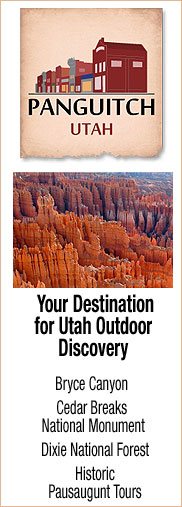








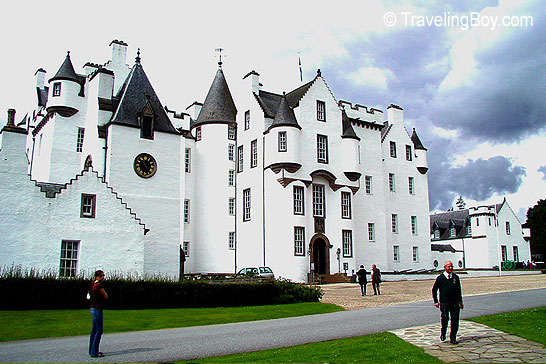
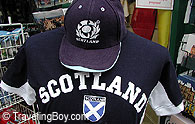 I
miss my former country folk. I miss their irreverence, their tolerance
for hardship---they take it in their stride. Over the centuries
they've had to, like most agricultural nations in the old days.
Winters were harsh and the soil in the Highlands was so rocky
it could not support large families on the farm. As some historian
said, "The fertility of Scottish women was greater than the
fertility of the soil hence the great Scottish immigrations across
the globe." Which means, I guess, there are people all over
the world talking with thick accents none of the locals understand.
I
miss my former country folk. I miss their irreverence, their tolerance
for hardship---they take it in their stride. Over the centuries
they've had to, like most agricultural nations in the old days.
Winters were harsh and the soil in the Highlands was so rocky
it could not support large families on the farm. As some historian
said, "The fertility of Scottish women was greater than the
fertility of the soil hence the great Scottish immigrations across
the globe." Which means, I guess, there are people all over
the world talking with thick accents none of the locals understand.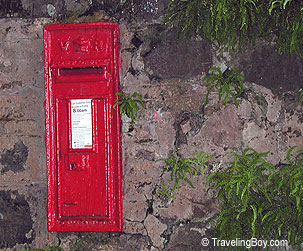
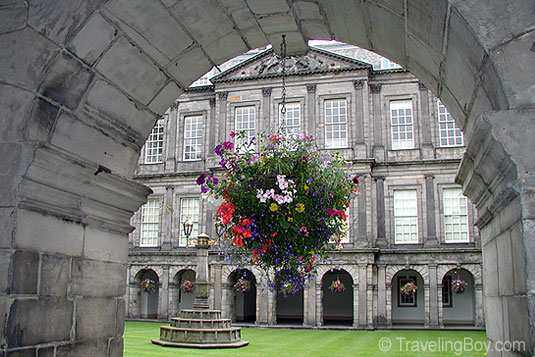
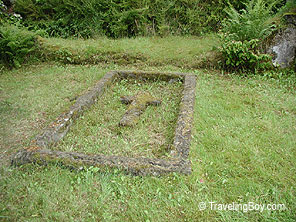
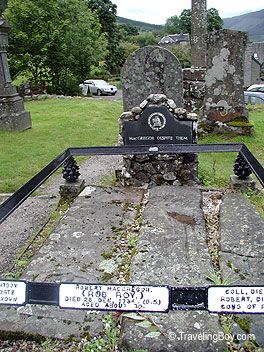
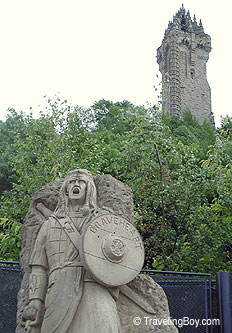
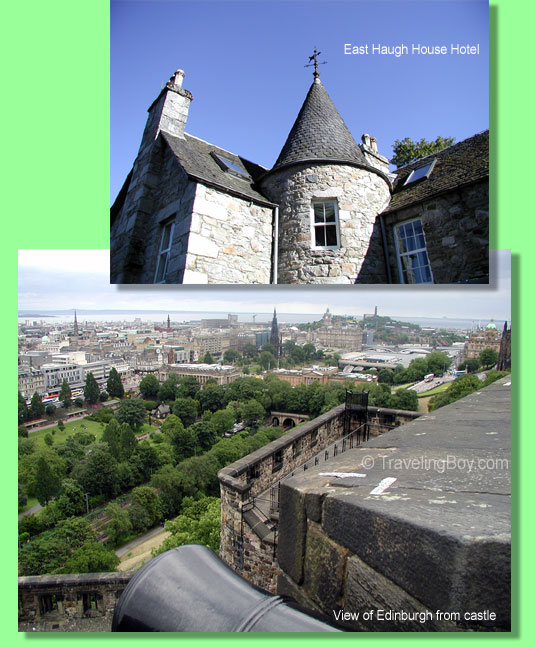
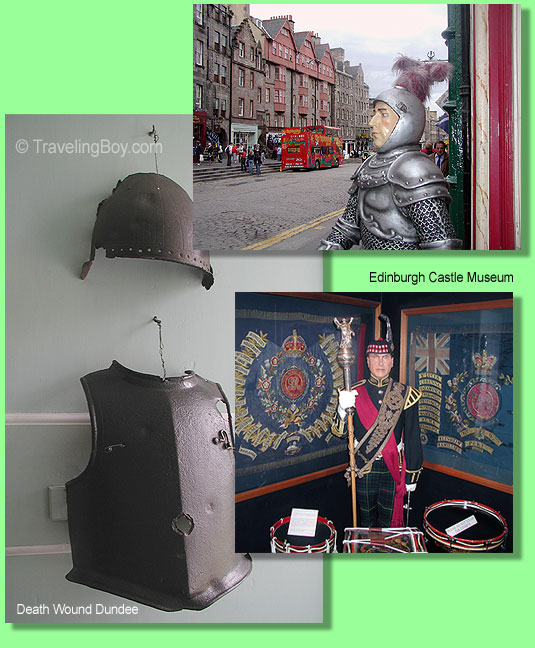 In
Edinburgh I like Channings 011 44 131 274 7401
In
Edinburgh I like Channings 011 44 131 274 7401 

















